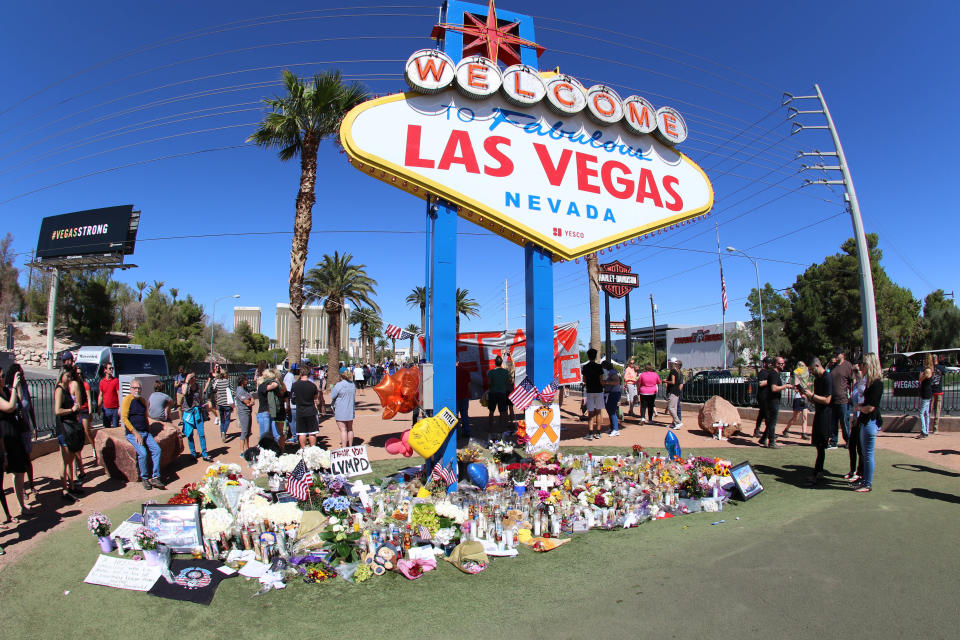Justice Department To Award $8.3 Million To California Victims Of Las Vegas Shooting
The Justice Department has announced an $8.3 million fund to support California victims of the 2017 mass shooting in Las Vegas, Nevada.
In remarks delivered at the Los Angeles Police Department on Thursday, Deputy Attorney General Rod Rosenstein said the DOJ’s Office for Victims of Crime would transfer the funds to the California Victim Compensation Board, to be set aside for victims of the shooting.
The massacre at the Route 91 Harvest Festival, an outdoor country music concert, on Oct. 1, 2017, was the deadliest mass shooting in modern U.S. history, leaving 58 people dead ― more than half of whom were from California.
“Thousands of California residents were present that day, and hundreds of them seriously wounded,” Rosenstein said, according to planned remarks distributed by the DOJ’s press office. “Immediately after the shooting, we began working with officials from California and Nevada to meet the needs of victims, their families, first responders, and the community.”

The deputy attorney general noted that the DOJ last year presented a grant of $16 million to the state of Nevada to aid survivors of the shooting.
“Today’s funding will help ensure that we are meeting the critical longer-term needs of victims, compensating them for financial losses and medical expenses and providing services like mental health counseling to victims and first responders,” he said.
The California Victim Compensation Board states on its website that it helps “victims of violent crime and their families deal with the emotional, physical, and financial aftermath of crime.”
Of the roughly 24,000 ticket holders at the concert, 65 percent were California residents; 35 of the 58 killed were from California; and over 600 Californians were injured in the attack, according to CalVCB.
“This tragic event affected so many people from both California and Nevada,” Julie Nauman, the board’s executive officer said in a statement on Thursday. “We encourage survivors and their family members who are struggling to recover to contact us.”
Survivors of violent crimes may apply for compensation through the board by submitting an application.
To be eligible for compensation, the board says an applicant must be able to show that they are a survivor of a “qualifying crime” and a California resident.
“For certain crimes, emotional injury alone is all that needs to be shown,” the board says on its website. “Certain family members or other loved ones who suffer an economic loss resulting from an injury to, or death of, a victim of a crime may also be eligible for compensation.”
In the case of the Route 91 shooting, the board said survivors have until Oct. 1, 2020, to apply.
The board said as of Thursday it had received some 3,500 applications for assistance from survivors of the shooting and distributed “over $4.5 million in benefits for mental health treatment, income loss, burial costs and other crime-related expenses.”
Some of the money from the DOJ would be put toward reimbursing CalVCB for benefits already paid to victims of the Route 91 shooting. The rest would go toward future payments to survivors, as well funding for support groups, anniversary and memorial events.
In its announcement about the Nevada grant last year, the DOJ said the funds were aimed at helping survivors “pay for counseling, therapy, rehabilitation, trauma recovery, and legal aid.”
Those eligible for the funds included “ticket holders, concert staff, vendors, witnesses, law enforcement personnel, and other first responders,” the DOJ said. The grant would also “support close family members, medical personnel, coroner’s staff, taxi drivers, and others who helped the concert attendees.”
This story has been updated to include a statement from the California Victim Compensation Board.
Love HuffPost? Become a founding member of HuffPost Plus today.
This article originally appeared on HuffPost.

